One of my earliest memories of early childhood was marching around the kitchen table with my mother along with radio personality Don McNeal and his Breakfast Club. We would march and laugh and duck under the table and laugh, and . . . then we would wash the breakfast dishes, still laughing together.
Other early memories include the smell of starch from freshly ironed shirts and the aroma of freshly baked pies and pastries. My mother was a fun-loving woman, but she was also very industrious. I later understood that the shirts, which covered all the kitchen walls by the time their owners came to claim them in the late afternoons, was one way that Mom could extend the housekeeping budget without actually getting a job, which my Dad wouldn’t allow, even when he was out of work. Baking pies and pastries daily also saved money. In childhood Mom had seen in her own family the struggles of the unemployed working class and always tried to protect me from that kind of knowledge.
Mom was born on May 14, 1920, the youngest of a large family, in the industrial north of England. She died in 2013. It would have been her birthday this week.
Much later in my life I discovered that shirt pressing was a skill Mom had learned at an early age. She left school at age 14 to toil six days a week in a laundry, while continuing to live with my grandmother in poor circumstances. As a little girl she had cultivated the weeds that tenaciously grew in the cracks in the pavement of their soot-stained back-to-back cottage. She often told me that these little plants taught her that beauty could be found in the bleakest of places. She dreamed of living somewhere beautiful.
Working in the laundry enlarged Mom’s horizons, and gave her a sense of purpose, of usefulness, attributes that she would always admire in others. She loved working with the other women, and the only times she brought on scolding from the manageress during her seven years there was when she forgot herself and start singing . . . apparently it distracted the other workers.
The last of eleven children, Mom had to grow up quickly. Even before leaving school at 14, she had collected bits of coal and coke for the cooking fire dropped in the street on fuel delivery day, and raised salad vegetables in her family allotment to sell to friends and neighbors. When she was 21, Mom joined the ATS, the Auxiliary Territorial Service, where she cleaned and restocked automotive parts, wound armatures, and sang at the top of her lungs with happiness. Now, not only did she get to wear a snazzy uniform and send money home to her mother, she was also able to save part of her pay each week and purchase cigarettes and silk stockings, luxuries she had only dreamed about while repairing the same pair of cotton stockings over and over again. She also ate three full meals a day, something she had never done before .
She met my Dad on a train the week before he was shipped overseas, and her life changed forever. They corresponded through the rest of the war and were married in 1945. I was born in 1947, and in 1949 we climbed aboard the RMS Queen Elizabeth and immigrated to the United States. Mama had been corresponding with her aunt and uncle for years, and their sponsorship provided the childless couple with free labor for a year, and it gave Mom and Dad a start in America.
Now instead of standing for ten hours a day at a mangle, pressing sheets and shirts, Mama stood at a table covered with blood and feathers, plucking chickens and preparing them for market, while I played alongside. And what did she do while she plucked chickens? She sang of course. Feathers flew and blood spattered every where while she belted out show songs and favorite ballads from the war years. After six days a week of working on the chicken farm with my uncle, my dad worked every Sunday for a concrete contractor, putting aside the money they would need a year later to buy a 39 Ford coupe. After a year on the chicken farm, dad drove 3000 miles to San Francisco, where Dad found work in his trade of cabinet maker.
As the daughter of such hard workers I was counseled to “learn a trade” and to “get an education,” two pursuits that, ironically, my parents never considered to be in conflict with one another. Wanting to make them proud, I obediently learned to type, then I typed my way through college and university and graduate school. Mom sometimes joined me at the community college at night. During the day she cooked and cleaned, and worked in a variety of factories, but in evening school she studied American history and Civics, memorizing the American national characters she had never studied in England, learning how a bill became a law, and finally, achieved her American citizenship. This must have been a real struggle for someone who was only able to attend primary school sporadically, and left at 14 to work in the laundry.
Next, she attended classes leading to a Real Estate license. As she pursued a variety of wage-earning positions, Mom learned how to fabricate plastic building blocks, glue silicon chips onto motherboards, and place children’s individual school pictures neatly and alphabetically around a larger class photo. Dad still would not allow her to contribute to the general family coffers – that was his responsibility – but Mom’s extra income allowed her to visit my grandmother in England from time to time, buy their first home, and save money for their eventual emigration to Canada. All during their years in California, Mama sang in the church choir, and I often heard her practicing hymns as she rolled out pastry, ironed the family laundry, or ran the vacuum cleaner. Even when the day’s work was done, Mama’s hands did not rest. That’s when she took out her knitting, and when she sat beside Dad each evening while he read the paper or watched television.
When dad retired from work in 1981, Mom and Dad moved to Vancouver Island where they had vacationed and fished for years. After clearing the land, building a house, and putting in a garden, they began to take part in community activities and to travel. They loved Canada and never regretted moving there. Their large garden gave both of them pleasure and they took full advantage of the weather and the beautiful surroundings.
Mom and Dad’s travels during the next 20 years, on and off island, Mom’s active and enthusiastic participation in aerobics, clogging, gardening, lawn bowling and other recreational pursuits, her intense love of family and friends, and the emotional support of her beloved church community, provided my mother with a full and rich life in her later years. Until her death in August, 2013 she loved to sing, and she loved to knit. She passionately loved her family. Indeed, she loved everyone she met.
Happy Birthday, Mama.
Share this post
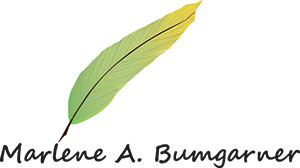
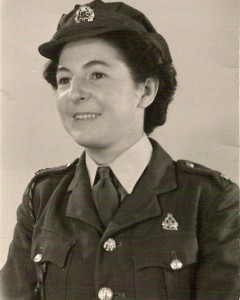
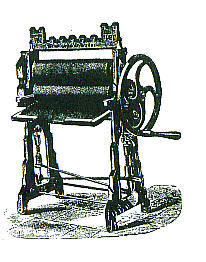
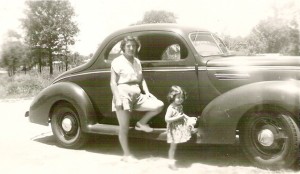
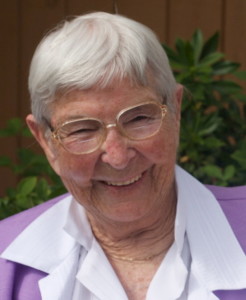
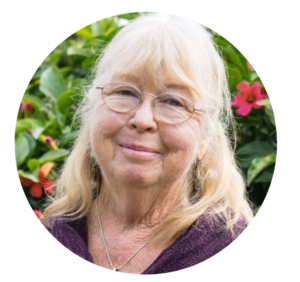
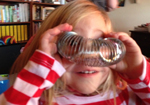

Hi Marlene, I remember getting to meet your parents at St. John’s when they would be visiting you. What an interesting life she had and I know that she was very proud of you.
Thanks, Linda. My mother always enjoyed visiting St. Johns. A Methodist unfamiliar with the rituals of our church, she made a quick stop at the liquor store on the way to our house for a small reception following my children’s baptism. Her comment – “I wanted to pick up some more red wine for your priest – he seemed to enjoy his wine; did you see the way he finished up what was in the Communion cup?”